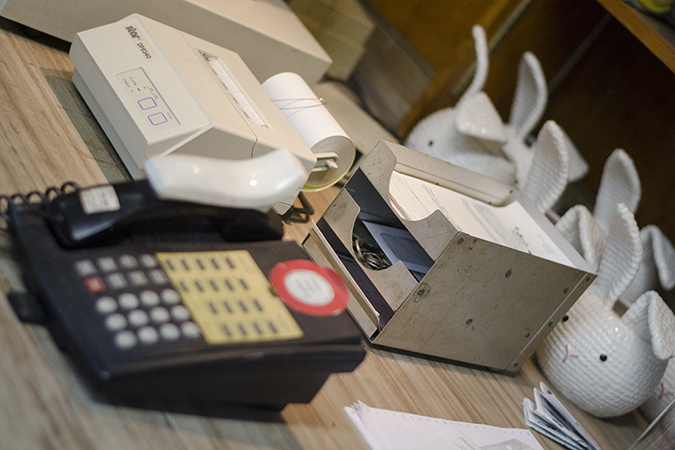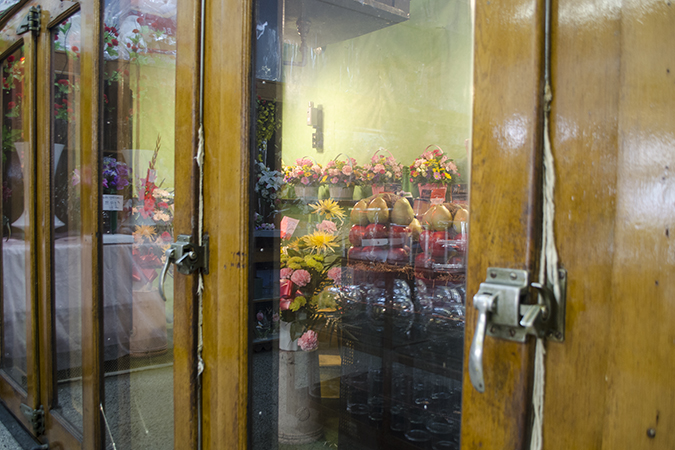Edward Wrobel’s earliest memories are of flowers, fruit, hard work - and more flowers.
He grew up in a small apartment above Orban’s Fruit and Flowers, the business his parents owned near the corner of E. 115th Street and Buckeye. It’s still here, and Edward still owns it - one of the last remaining white-ethnic businesses from a time a couple generations ago when Buckeye Road was reputedly home to the largest population of Hungarians outside Budapest.
“The store was like my big brother,” he says. “I was down here all the time with my parents, helping out.”
He’s talking to me, Seth and Julia in the store’s spacious storefront. Surrounding us are greeting card displays, gift baskets and bouquets of artificial flowers (the real ones are kept mostly in back).
Now 72, Edward inherited Orban’s when his parents retired. His mother, Edythe, had herself worked in the store from the time she was 13, eventually buying it from the original owners (she kept their name above the door). Edward keeps a painted portrait of her hanging on a back wall, along with vintage photos of the store and street.
Orban’s has existed at this location since its white-brick building - complete with vintage neon sign - was constructed in 1921. Its most striking original feature is a wood-and-glass cooler housing live flowers and fruit baskets.
The shop’s heyday, Edward says, coincided with his own childhood in the late 1950s and early 1960s. The phone rang constantly, and Orban’s couldn’t add staff fast enough. Part of the credit for that goes to Edythe, who spoke Hungarian and maintained strong relationships with residents and the neighborhood’s many churches.
Back then, Easter was the busiest time of year, with churches ordering elaborate displays and parishioners clamoring for personal adornments.
Weeks ahead of the holiday, the store’s basement would become a flower factory, with family and friends joining forces to craft crosses, hearts and as many as 3,000 Easter corsages.
Must have smelled good, right?
He shakes his head. “A lot of sweat, is what it smelled like,” he says. “And, if anything, food. We’d make sandwiches down there, set up a little kitchen.”
He shows us around the rest of the store, which stretches thousands of square feet beyond the storefront to encompass a garage for his delivery trucks and a large arranging area where three employees fill orders and arrange bouquets.
Upstairs, a yawning warehouse space is straight out of a kid’s dream. It’s crammed with enormous styrofoam candy canes, an old chandelier, a dollhouse - all used for displaying flowers at different times of the year.
On one bookshelf lies a shattered, toddler-sized Pinocchio doll, once used in one of Orban’s famous window displays.
“He got struck by lightning one night while he was lying in the back there,” Edward says, picking the doll up. “He had a friend, too -” he scans the cavernous space -- “but I guess he’s not here anymore. Lightning went straight through his eye. You could see the burn hole.”
What’s kept Orban’s in business on Buckeye when so many of its former neighbors have long since shuttered or moved to the suburbs?
Two things, Edward says: The telephone and the Internet. Hungarian families who used to live here but now live in the suburbs still order Orban’s flowers, as do more recent customers sending bouquets to the hospitals in University Circle.
There’s walk-in traffic from current residents, too, but nowhere near enough to keep the store afloat. Residents’ income levels are far lower than they once were.
“It used to be, every member of a family would come in here and buy something separately. Now, five or six people will come in and put their money together to buy one thing.”
Edward says he’s considered leaving Buckeye over the years. But to recreate Orban’s infrastructure in a suburban location such as Mayfield Road would likely cost in excess of $1 million. He wouldn’t be able to recoup even a fraction of that by selling the store’s current location.
Another reason - if admittedly a secondary one - is his loyalty to the street. He served on the Buckeye Shaker Square Development Corporation board for decades, and feels strong family ties to the neighborhood even though he now lives in far-suburban Russell Township.
When he is ready to retire, which could be “any day now,” he’ll try to sell the store. He says it’s still a profitable business, and could become even more so with an energetic owner able to make new connections with, for example, marriage consultants (his own children aren’t interested).
It’ll be hard work, physically and emotionally, clearing out several generations’ worth of material from the building.
Just the other day, he was up in the old family apartment to fix a roof leak. He doesn't rent the space - more trouble than it’s worth - so all his mother’s furniture is still there.
“It feels emotional, seeing all her things,” he says.
We’re standing next to Edythe’s portrait, and he glances up. “Usually, I’m up there busy because I have a certain task. But when I stop to look around, all the memories come back.”


















